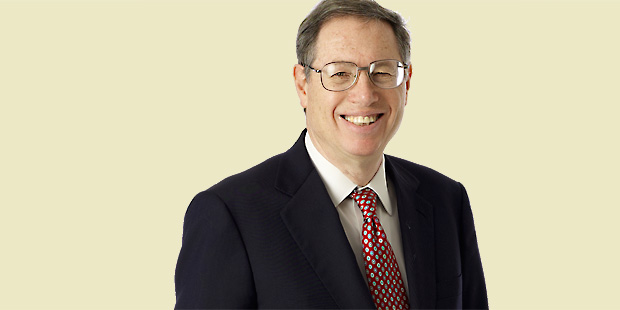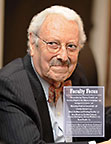Introducing Richard Epstein
Visiting Professor of Law
Printer Friendly VersionA classical libertarian arguing against universal health care, Richard Epstein was clearly at a disadvantage when he took the podium in April 2008 to debate Americans’ right to health care. He was in Massachusetts, the only state that requires health coverage, and participating in a forum sponsored by PBS. He faced JudyAnn Bigby, an advocate of the state’s near universal coverage plan and the secretary of health. “It was the worst possible setting for him,” says one of his opponents, Regina Herzlinger of Harvard Business School.
Rarely coy, Epstein began by declaring that Wal-Mart could provide health coverage better than Massachusetts could. Then in a move Herzlinger called “Kissingeresque,” Epstein distanced himself from his teammate, who was presenting a distasteful argument, and reached across the aisle to her. “It took him about five minutes to realign three of the four debaters,” she says. Afterward, Epstein was “surrounded by people who may not have liked what he had to say but were dazzled by his brilliance.”
Epstein’s debating skills are legendary, as is almost everything about the man. It’s been said that taking notes in his class is like trying to fill a Dixie cup with water from Niagara Falls. “Richard speaks without breathing, and in perfect paragraphs,” says Samuel Issacharoff, Bonnie and Richard Reiss Professor of Constitutional Law. During the timed closing remarks in Boston, Epstein got in 35 percent more words than did his opponent (218 words per minute versus 161).
It seems he knows something about everything, and his reach extends beyond the academy to newspaper op-eds, podcasts, and even YouTube videos. He’s written and edited 22 books on diverse subjects. At the University of Chicago, he has taught 27 different courses—including Roman law—since 1972. Epstein, who has been an annual visiting professor at the NYU School of Law since 2005, plans to follow suit when he permanently joins the faculty in 2010. “Whatever they ask is what I teach,” Epstein says. “That’s always been my rule.”
He trains students to speak off-the-cuff—a practice that can fell even the ablest. He calls on a student closest to the aisle, then moves rapidly down the row, getting through half the class in an hour. “He’s intimidating at first, but he’s not trying to embarrass you,” says Michael Schachter ’10, who nearly blacked out once when Epstein worked his way toward him in Contracts.
Epstein can debate any topic with ease because his arguments have a common denominator: classical liberalism. “I’m working off a strong, central theorem,” he says. In a nutshell: He believes in individual freedom, but not unconstrained by the rights of others, and in limited government with an eye toward the common good.
In his best-known work, Takings: Private Property and the Power of Eminent Domain (1985), which has been cited in four U.S. Supreme Court cases, he doesn’t come down against eminent domain per se, but argues that the government should be required to provide the same protections as any private entity in a property dispute. “He, more than any other scholar, has had an impact on reopening issues about property rights that have been neglected for decades in the constitutional literature,” says Vanderbilt law professor James Ely. Epstein is currently working on a book that analyzes the Constitution through libertarian eyes. The Tulsa Law Review, which traditionally honors constitutional scholars, dedicated its 2008 symposium to Epstein’s complete works.
Predictably, Epstein opposes most of the positions of his one-time colleague President Barack Obama. He does support the president’s call to safeguard habeas corpus rights and close Guantánamo Bay, while reserving his highest compliment for Obama’s skill in another arena altogether: the basketball court. “He’s a great player, but not the equal of Arne Duncan, his education secretary,” says Epstein, who played with those two plus First Brother-in-Law Craig Robinson at a party for Marty Nesbitt, Obama’s campaign treasurer.
Epstein was raised with his two sisters in what he calls “a perfectly conventional Brooklyn home.” His father, Bernard, was a radiologist, and his mother, Catherine, “a basic New Deal liberal,” ran Bernard’s office. Epstein did well in school, but was not a model student. He bounced out of his seat to blurt out answers, often lost his homework, and wasn’t a particularly good test-taker. “I had a bunch of teachers who prophesied an ugly end to my academic career,” he recalls. That didn’t stop him from getting into Columbia College. As a student during the height of the turbulent 1960s, Epstein stood apart from the protests. “I’ve always been a contrarian intellectual, and when I see lots of people out there chanting and screaming, my first reaction is that they’ve got to be wrong,” he says.
He graduated in 1964, earning a Kellett Fellowship to study at Oxford. The English curriculum was oriented toward private law, so he found himself immersed in work by judges with classical libertarian leanings. He received his B.A. in jurisprudence in 1966, then entered Yale Law School, earning his LL.B. in 1968.
During the next four years he taught law at the University of Southern California and met his wife, Eileen, a professional fundraiser. They have three children. At the University of Chicago, Epstein headed the John M. Olin Program in Law and Economics, and in 2001 served as interim dean when his predecessor left unexpectedly. “He filled the gap selflessly. People thought of him as a steady rock,” says Chicago colleague Douglas Baird.
In 2005, Epstein began splitting his year between Chicago and New York. “This is a faculty that is convivial and highly professional,” he says. “I like the culture.” His appointment allows him to keep his connection with the Hoover Institution at Stanford University, where he has been a fellow since 2000, and spoil his granddaughter, Bella. In his leisure time he plays basketball and does crossword puzzles. With typical humility, he notes, “I have progressed from rank amateur to respectable mediocrity, and sometimes surprise myself by finishing a Saturday New York Times puzzle.”
–
All of 2009 Faculty Focus


 Multimedia
Multimedia